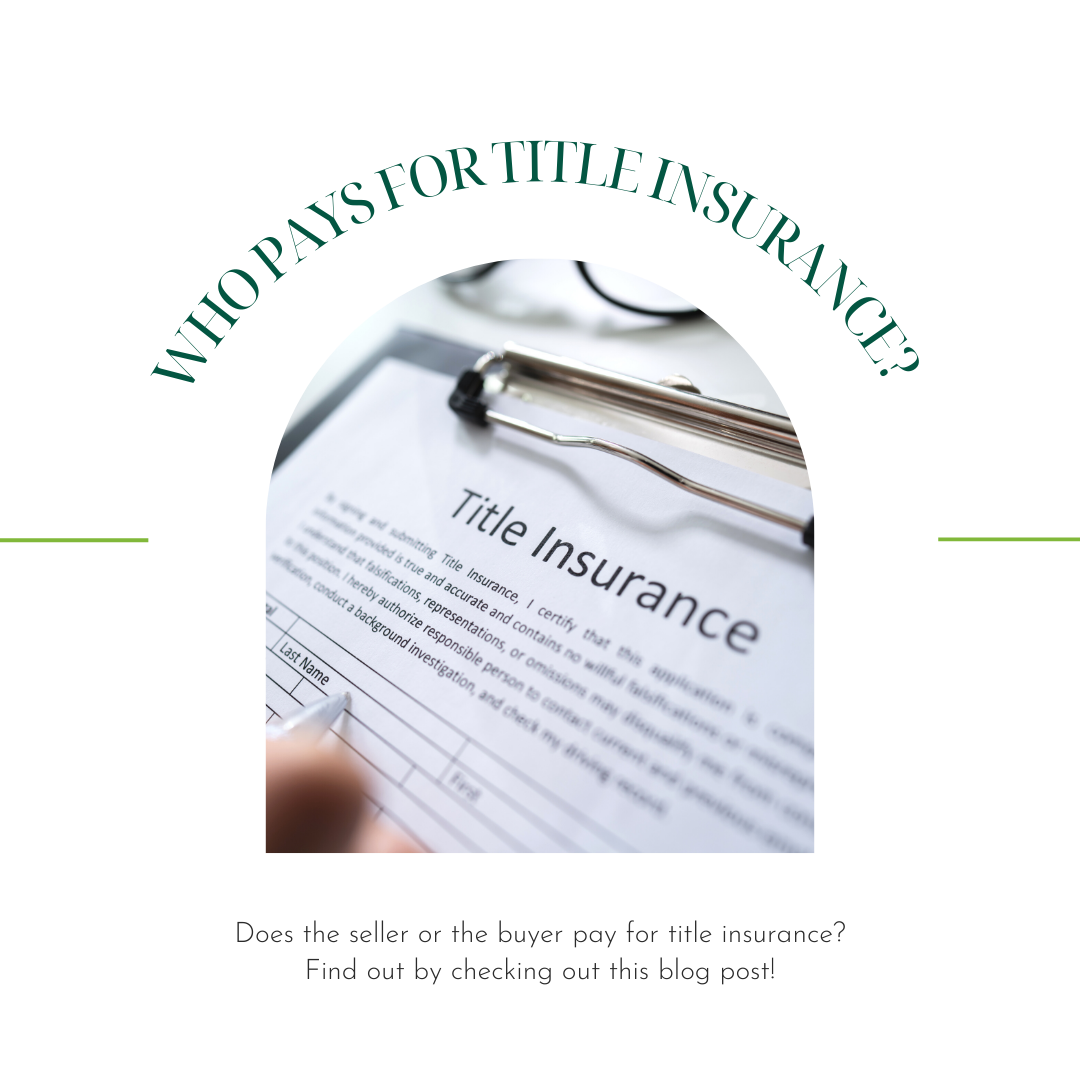Who is responsible for paying the fee for the title search quizlet?
Before a lender will agree to lend money on a property, the lender will order a title search to be sure there are no liens on the property. The buyer is responsible for paying the fee for the title search.
What is the recording charge the buyer usually pays for in a real estate settlement?
Recording fees: These fees may be paid by you or by the seller, depending upon your agreement of sale with the seller. The buyer usually pays the fees for legally recording the new deed and mortgage.
Who will pay the required fees for recording the deed quizlet?
Is title insurance capitalized or expensed?
Is a real estate agent and real estate investor the same thing?
Real Estate Agents Need a License
In order to ensure that the agent is honest, he or she has to follow a certain set of guidelines that the license mandates. In contrast, a real estate investor is someone who buys and sells properties for himself or herself; the investor does not represent anyone else.



Why sell to a real estate investor?
When you sell your home to an investor, you'll get a quick, cash offer without having to go through the typical process of cleaning and staging the house, dealing with real estate showings and paying for repair or renovation work.
Frequently Asked Questions
Is a real estate investor a job?
Real estate investment is a unique field that involves economics, creativity, home improvement, marketing and design. It's a lucrative career with the potential to offer people financial freedom for the future.
Who keeps earnest money if deal falls through?
Seller
The purpose of earnest money is to provide the seller with compensation in the event that the buyer backs out of the deal through no fault of the seller and in violation of the agreements in the purchase contract. If that happens, the seller gets to keep the earnest money.
Does escrow mean you got the house?
Is real estate investing better than being an agent?
Real estate agents earn commissions on their deals. This can vary from 1% to 5%, or sometimes even more, depending on the property. However, a real estate investor earns no commission; rather, the investor benefits from the difference between the purchase price and sale price of a property.
Do real estate investors make a lot of money?
Is a real estate investor a good job?
Real estate investment is a unique field that involves economics, creativity, home improvement, marketing and design. It's a lucrative career with the potential to offer people financial freedom for the future.
What makes more money real estate or stocks?
Many investors buy real estate and stocks to build wealth over time. While both provide the potential for substantial profits, they differ in rates of return, risk, liquidity and accessibility. Returns. Historically, stocks have offered better returns than real estate investments.
Which category of real estate makes the most money?
Real Estate Broker
A real estate broker is permitted under law to negotiate and organize real estate dealings. A career as a real estate broker is one of the highest paying and lucrative professions in the real estate industry. On average, experienced brokers take home a six-figure pay.
FAQ
- Is a real estate investor the same as a broker?
Investors, on the other hand, are not controlled by a broker. They are running their own business and may or may not have their own employees. What does this mean for you? A real estate agent, in theory, understands the service standards and requirements of their broker.
- Can real estate agents be millionaires?
- It can be done. In fact, it has been done. But it doesn't happen by luck or accident. This is the first in a series of articles detailing how you, as a newly licensed agent, could set yourself up to be successful enough to to make $1 million in your first year.
- What is the difference between a realtor and a real estate investor?
Working in real estate is exactly what a real estate agent does. He/she only deals with real estate transactions and not the properties themselves. On the other hand, a real estate investor is the one who makes a living by purchasing investment properties and using them to generate money in the long-term.
- What are the disadvantages of being a real estate investor?
Real estate investments tend to have high transactional costs, especially in legal and brokerage fees. The process of acquiring a new property is also very long and tedious with lots of legal formalities. Another disadvantage of property investments is that they are not easy to liquidate.
- What do investors do in real estate?
Real estate investing involves the purchase, management and sale or rental of real estate for profit. Someone who actively or passively invests in real estate is called a real estate entrepreneur or a real estate investor. Some investors actively develop, improve or renovate properties to make more money from them.
- Who typically holds the earnest money?
Typically, you pay earnest money to an escrow account or trust under a third-party like a legal firm, real estate broker or title company. Acceptable payment methods include personal check, certified check and wire transfer. The funds remain in the trust or escrow account until closing.
- Who makes money in a real estate transaction?
- Most real estate agents make money through commissions that are paid directly to brokers when transactions are settled. A single commission is often split multiple ways, among the listing agent, the listing broker, the buyer's agent, and the buyer's agent's broker.
- Who holds the money in escrow?
Funds or assets held in escrow are temporarily transferred to and held by a third party, usually on behalf of a buyer and seller to facilitate a transaction. "In escrow" is often used in real estate transactions whereby property, cash, and the title are held in escrow until predetermined conditions are met.
Who pays for title exam insurance and recording fees in real estate transactions?
| Who gets earnest money when buyers back out? | If the buyer backs out just due to a change of heart, the earnest money deposit will be transferred to the seller. Be sure to watch the expiration date on contingencies, as it can impact the return of funds. |
| Who pays for the title policy in Texas? | In Texas, the seller traditionally pays for title insurance. Your coverage will protect you against errors in the public record, undisclosed liens, and forgery. |
| Who pays for title endorsement fee in Florida? | While the answer varies from county to county, the seller usually pays for title insurance in Florida. The seller doesn't need the insurance for themself though; covering the cost of the buyer's title insurance policy is generally regarded as a gesture of good will. |
| Who orders title search in NY? | The buyer or the buyer's lender will order a title search to ensure that there are no liens or other encumbrances on the property. In some cases, the seller may also order a title search to ensure that the property is free and clear of any liens or other issues that could delay or prevent the sale of the property. |
| Which of the following parties typically pays the broker's commission? | Commissions generally range between 5% and 6% of the final sale price, though they may be higher or lower based on market conditions. 5 Unless the buyer and seller negotiate a split, it is the seller who pays the commission. |
| Is it a good idea to sell your house to an investor? | Selling to an investor means a quicker — and smoother — sale. Big plus: Not waiting around for months for potential buyers to make a decision. Selling a home quickly helps you avoid extra mortgage payments, prevent vandalism in vacant homes, and pocket money you can use when and where you need it. |
| Is a real estate investor the same as agent? | A real estate agent works in the real estate industry. He or she doesn't deal with the actual properties; only real estate transactions. A real estate investor, on the other hand, is someone who earns a living by buying investment properties and using them to gain money over the long haul. |
| What do investors look for when buying a house? | The adage "location, location, location" is still king and continues to be the most important factor for profitability in real estate investing. Proximity to amenities, green space, scenic views, and the neighborhood's status factor prominently into residential property valuations. |
- Do investors pay asking price?
- Investors typically pay no more than 70% of a home's fair market value (after repairs, and minus repair costs). In exchange for a low price, they can often pay the seller in cash and close very quickly — in some cases, in as little as a week.
- Is it hard to be a successful real estate investor?
Investing in real estate can be successful, but going it alone can be challenging and highly risky. Joint ventures, wholesaling, and property management are just a few of the ways that investors can profit from real estate. It also takes a little savvy to become successful in this highly competitive arena.
- Are real estate agents and investors the same?
Real Estate Agents Need a License
In order to ensure that the agent is honest, he or she has to follow a certain set of guidelines that the license mandates. In contrast, a real estate investor is someone who buys and sells properties for himself or herself; the investor does not represent anyone else.
- Are buyers and investors the same?
- Investors are people or companies that want to purchase your home in order to make money. So negotiations will go differently (and hopefully easier) than they would if the buyer was going to live on your property. But sometimes the investor(s)' intention should be reason enough to give you pause.
- Is being a real estate investor profitable?
- Real estate often proves to be a lucrative investment, offering both income — in the form of rents and appreciation — when you sell appreciated property at a profit. It's also a good way to diversify your portfolio, as an asset that's subject to different influences than stocks and bonds.
- Which will make you richer real estate or stocks?
Historically, stocks have offered better returns than real estate investments. "Stocks have returned, on average, about 8% to 12% per year while real estate has generated returns of 2% to 4% per year," says Peter Earle, an economist at the American Institute for Economic Research.
- Is real estate investor a good career?
- Real estate investing can be lucrative, but you must have a plan. Successful real estate investors understand three critical aspects of the business: They understand what the market needs.
- Do most millionaires get rich from real estate?
“90% of all millionaires become so through owning real estate.” This famous quote from Andrew Carnegie, one of the wealthiest entrepreneurs of all time, is just as relevant today as it was more than a century ago. Some of the most successful entrepreneurs in the world have built their wealth through real estate.
Recent Comments